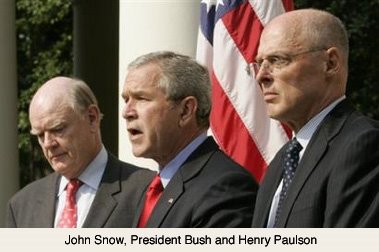 In a long-expected move, Treasury Secretary John Snow has resigned. Bush quickly nominated Goldman Sachs CEO Henry Paulson to replace him.
In a long-expected move, Treasury Secretary John Snow has resigned. Bush quickly nominated Goldman Sachs CEO Henry Paulson to replace him.
It's been something of a revolving door at that position; Paulson will be Bush's third Treasury Secretary. Both of the previous ones (Snow and Paul O'Neill) did decent jobs, but that wasn't quite enough:
The administration is said to have been dissatisfied with both previous Treasury secretaries, believing that they could have done more to get credit for the administration for economic growth.
News flash: presidents aren't generally responsible for economic performance, good or bad. Yes, they tend to be held responsible, and it's better to preside over a good economy than a bad one. But it's hard for a Treasury secretary to make a case for a causal connection that doesn't exist.
There were other problems with the job.
Snow informed the White House last week that he would resign after three years as the nation's chief economic officer. The secretary's decision was intended to bring finality to a process that has played out awkwardly in public over months as Snow's job security has been a regular source of Washington speculation....
But the White House spent months trying to find a prominent Wall Street figure to replace Snow, only to run into reluctance by many to take the cabinet job when economic policy was being set inside the White House.
That left Snow hanging out in the Washington rumor mill even amid reports that the White House wanted him out.
The Washington rumor mill can be pitiless, and who really wants to be a figurehead with no real power? Well, other than Tony Snow, that is....
One might well wonder why Paulson agreed to become that figurehead, especially for a lame-duck president with abysmal poll numbers who has made it clear that the job's main duty will be cheerleading the economy. He, like Snow, received assurances that he would
"play a central role" in setting economic policy, but given his outsider status and the not-so-encouraging history of the Bush administration in that regard, I'm not holding my breath.
Which is too bad. Because Paulson isn't a bad choice, and some of his other biographical details -- chairman of the
Nature Conservancy, for instance -- could lead one to envision him as a conduit for breaking the ideological orthodoxy that has guided the administration since 2000.
Call me cynical, but I expect him to be quickly isolated by other administration insiders, to never gain the policy-making influence he was promised and to grow frustrated with his cheerleader-in-chief role. We may not have seen the last Treasury nomination of this administration.
Side noteFor those interested, Bush outright lied about the subject on Thursday:
That timeline raised questions about the president comments on Thursday night — four days after Mr. Paulson accepted the job — that he had not spoken to Secretary Snow about his long rumored departure from Treasury.
During a joint news conference with Prime Minister Tony Blair of Great Britain, Mr. Bush was asked directly by a reporter whether Mr. Snow had given him any indication that he intended to resign soon. Mr. Bush replied, "No, he has not talked to me about resignation. I think he's doing a fine job."
Tony Snow, said today that Mr. Bush was speaking "artfully," to avoid upsetting the markets with a nomination that he was not yet ready to announce, pending a background check.
"Artfully"? It was a lie. I don't want to make too much of this -- it's understandable that Bush was not ready to reveal his choice, and did not want to surprise the markets -- but a flat-out lie is never a good idea. The president should not lie to the press, because once he has done so, it makes everything else he says suspect. He can refuse to answer, dodge the question, be deliberately vague -- any of a dozen strategies for controlling the flow of information. But lying should not even be considered -- something you'd think Bush would have learned by the fifth year of his presidency.
As you might suspect, left-leaning sites are
all over this.
Treasury, Paulson, Snow, Bush, politics, midtopia

